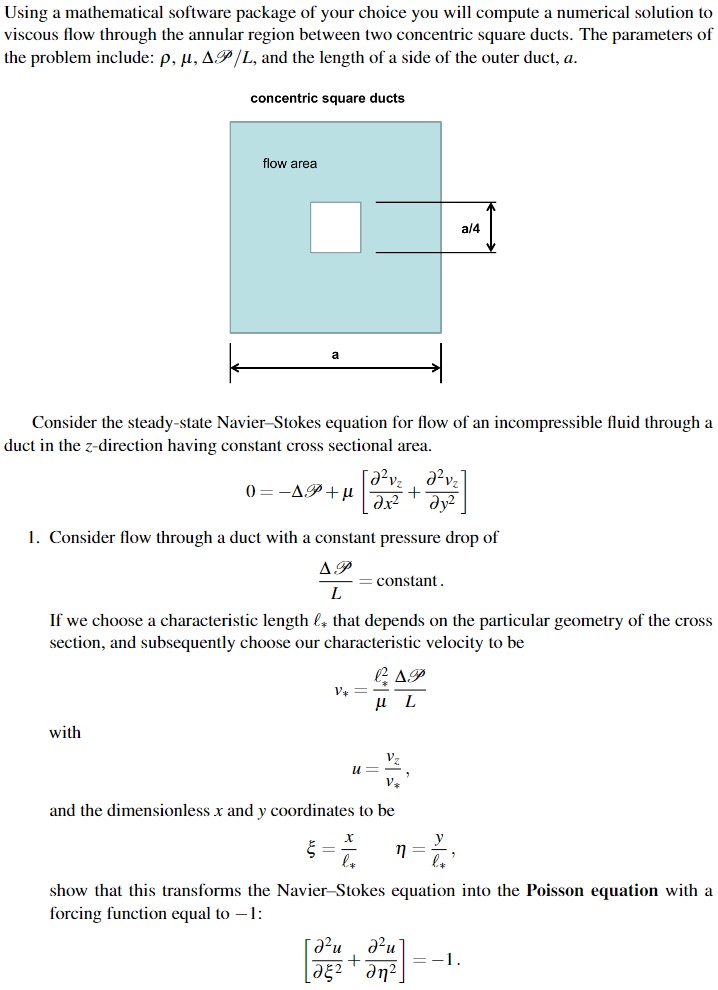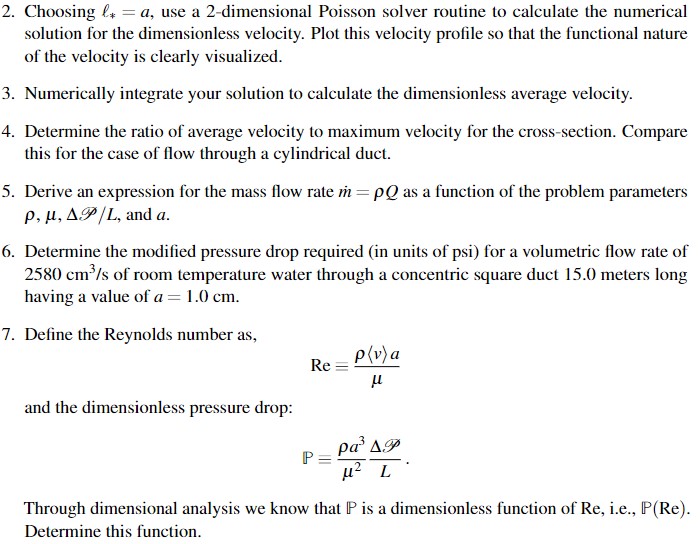Answered step by step
Verified Expert Solution
Question
1 Approved Answer
Using a mathematical software package of your choice you will compute a numerical solution to viscous flow through the annular region between two concentric square

 Using a mathematical software package of your choice you will compute a numerical solution to viscous flow through the annular region between two concentric square ducts. The parameters of the problem include: ,,P/L, and the length of a side of the outer duct, a. concentric square ducts Consider the steady-state Navier-Stokes equation for flow of an incompressible fluid through a duct in the z-direction having constant cross sectional area. 0=P+[x22vz+y22vz] 1. Consider flow through a duct with a constant pressure drop of LP=constant If we choose a characteristic length that depends on the particular geometry of the cross section, and subsequently choose our characteristic velocity to be v=2LP with u=vvz and the dimensionless x and y coordinates to be =x=y show that this transforms the Navier-Stokes equation into the Poisson equation with a forcing function equal to -1 : [22u+22u]=1 2. Choosing =a, use a 2-dimensional Poisson solver routine to calculate the numerical solution for the dimensionless velocity. Plot this velocity profile so that the functional nature of the velocity is clearly visualized. 3. Numerically integrate your solution to calculate the dimensionless average velocity. 4. Determine the ratio of average velocity to maximum velocity for the cross-section. Compare this for the case of flow through a cylindrical duct. 5. Derive an expression for the mass flow rate m=Q as a function of the problem parameters ,,P/L, and a. 6. Determine the modified pressure drop required (in units of psi) for a volumetric flow rate of 2580cm3/s of room temperature water through a concentric square duct 15.0 meters long having a value of a=1.0cm. 7. Define the Reynolds number as, Re=va and the dimensionless pressure drop: P=2a3LP. Through dimensional analysis we know that P is a dimensionless function of Re, i.e., P(Re). Determine this function. Using a mathematical software package of your choice you will compute a numerical solution to viscous flow through the annular region between two concentric square ducts. The parameters of the problem include: ,,P/L, and the length of a side of the outer duct, a. concentric square ducts Consider the steady-state Navier-Stokes equation for flow of an incompressible fluid through a duct in the z-direction having constant cross sectional area. 0=P+[x22vz+y22vz] 1. Consider flow through a duct with a constant pressure drop of LP=constant If we choose a characteristic length that depends on the particular geometry of the cross section, and subsequently choose our characteristic velocity to be v=2LP with u=vvz and the dimensionless x and y coordinates to be =x=y show that this transforms the Navier-Stokes equation into the Poisson equation with a forcing function equal to -1 : [22u+22u]=1 2. Choosing =a, use a 2-dimensional Poisson solver routine to calculate the numerical solution for the dimensionless velocity. Plot this velocity profile so that the functional nature of the velocity is clearly visualized. 3. Numerically integrate your solution to calculate the dimensionless average velocity. 4. Determine the ratio of average velocity to maximum velocity for the cross-section. Compare this for the case of flow through a cylindrical duct. 5. Derive an expression for the mass flow rate m=Q as a function of the problem parameters ,,P/L, and a. 6. Determine the modified pressure drop required (in units of psi) for a volumetric flow rate of 2580cm3/s of room temperature water through a concentric square duct 15.0 meters long having a value of a=1.0cm. 7. Define the Reynolds number as, Re=va and the dimensionless pressure drop: P=2a3LP. Through dimensional analysis we know that P is a dimensionless function of Re, i.e., P(Re). Determine this function
Using a mathematical software package of your choice you will compute a numerical solution to viscous flow through the annular region between two concentric square ducts. The parameters of the problem include: ,,P/L, and the length of a side of the outer duct, a. concentric square ducts Consider the steady-state Navier-Stokes equation for flow of an incompressible fluid through a duct in the z-direction having constant cross sectional area. 0=P+[x22vz+y22vz] 1. Consider flow through a duct with a constant pressure drop of LP=constant If we choose a characteristic length that depends on the particular geometry of the cross section, and subsequently choose our characteristic velocity to be v=2LP with u=vvz and the dimensionless x and y coordinates to be =x=y show that this transforms the Navier-Stokes equation into the Poisson equation with a forcing function equal to -1 : [22u+22u]=1 2. Choosing =a, use a 2-dimensional Poisson solver routine to calculate the numerical solution for the dimensionless velocity. Plot this velocity profile so that the functional nature of the velocity is clearly visualized. 3. Numerically integrate your solution to calculate the dimensionless average velocity. 4. Determine the ratio of average velocity to maximum velocity for the cross-section. Compare this for the case of flow through a cylindrical duct. 5. Derive an expression for the mass flow rate m=Q as a function of the problem parameters ,,P/L, and a. 6. Determine the modified pressure drop required (in units of psi) for a volumetric flow rate of 2580cm3/s of room temperature water through a concentric square duct 15.0 meters long having a value of a=1.0cm. 7. Define the Reynolds number as, Re=va and the dimensionless pressure drop: P=2a3LP. Through dimensional analysis we know that P is a dimensionless function of Re, i.e., P(Re). Determine this function. Using a mathematical software package of your choice you will compute a numerical solution to viscous flow through the annular region between two concentric square ducts. The parameters of the problem include: ,,P/L, and the length of a side of the outer duct, a. concentric square ducts Consider the steady-state Navier-Stokes equation for flow of an incompressible fluid through a duct in the z-direction having constant cross sectional area. 0=P+[x22vz+y22vz] 1. Consider flow through a duct with a constant pressure drop of LP=constant If we choose a characteristic length that depends on the particular geometry of the cross section, and subsequently choose our characteristic velocity to be v=2LP with u=vvz and the dimensionless x and y coordinates to be =x=y show that this transforms the Navier-Stokes equation into the Poisson equation with a forcing function equal to -1 : [22u+22u]=1 2. Choosing =a, use a 2-dimensional Poisson solver routine to calculate the numerical solution for the dimensionless velocity. Plot this velocity profile so that the functional nature of the velocity is clearly visualized. 3. Numerically integrate your solution to calculate the dimensionless average velocity. 4. Determine the ratio of average velocity to maximum velocity for the cross-section. Compare this for the case of flow through a cylindrical duct. 5. Derive an expression for the mass flow rate m=Q as a function of the problem parameters ,,P/L, and a. 6. Determine the modified pressure drop required (in units of psi) for a volumetric flow rate of 2580cm3/s of room temperature water through a concentric square duct 15.0 meters long having a value of a=1.0cm. 7. Define the Reynolds number as, Re=va and the dimensionless pressure drop: P=2a3LP. Through dimensional analysis we know that P is a dimensionless function of Re, i.e., P(Re). Determine this function Step by Step Solution
There are 3 Steps involved in it
Step: 1

Get Instant Access to Expert-Tailored Solutions
See step-by-step solutions with expert insights and AI powered tools for academic success
Step: 2

Step: 3

Ace Your Homework with AI
Get the answers you need in no time with our AI-driven, step-by-step assistance
Get Started


